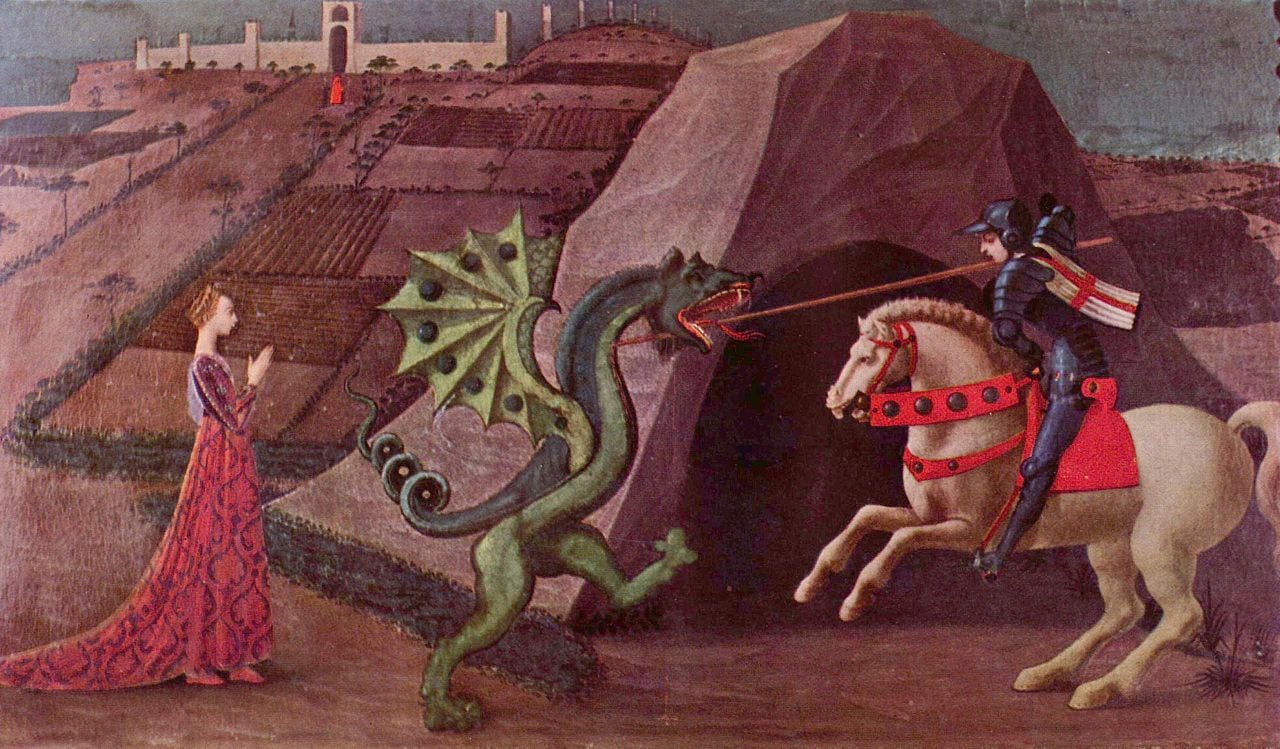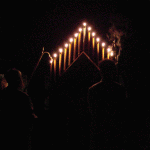Phil simply does not understand what it takes to be a good man for such a good woman. Because he is a human being made in the image and likeness of God like we all are, he intuits what he wants and what he is but gets lost in the articulation of those things. He needs a guide. After many attempts at self-slaughter, he decides to tell Rita exactly what is happening to him. He starts by saying that he is a god. She replies, “You’re not a god. Trust me. This is twelve years of Catholic school talking.”
This gives us a clue as to what Phil lacks and what he so badly needs—a bit of remedial and illuminative theological education. Deep down he understands this, and at the end of the full-disclosure day, he confesses his feelings and desires to Rita as she sleeps:
What I wanted to say was I think you’re the kindest, sweetest, prettiest person I’ve ever met in my life. I’ve never known anyone who is nicer to people than you are. The first time I saw you… something happened to me. I never told you but… I knew that I wanted to hold you as hard as I could. I don’t deserve someone like you. But if I ever could, I swear I would love you… for the rest of my life.
And so begins Phil’s education, as illustrated by a very enjoyable self-improvement sequence. He reads voraciously, learns to play the piano and ice sculpt, and performs random acts of kindness around town.
All of this mortifies his concupiscent urges. It also schools him in virtue so that he begins to live well, which as he discovers, means living for others—serving others through beauty and good deeds. His self-mastery affords him the freedom to choose the good, and finally, to give of himself.
Rita’s idea of fun — “good clean fun” — has become Phil’s own. He begins a February 2nd cheerfully and warmly as he quotes Chekov and delivers a beautiful speech about winter to the Gobbler’s Knob crowd and the viewing news audience. Instead of treating himself, he brings breakfast for his co-workers and carries their heavy bags. Rita is so intrigued by this that she asks him to spend time with her, but he has a list of “errands” to perform, all of which involve him spending his body for the sake of others: jacking up a car to change a flat tire, catching a boy falling from a tree, and performing the Heimlich on a choking man.
At the groundhog party that night, all of these good deeds gather around to praise him like a Medieval allegory play. The beneficiaries of his kindness parade before him to express their gratitude as he dances with Rita. She begins to see that this man is the kind of man she is looking for. At the bachelor auction, which benefits a local charity, Rita unnecessarily cleans out her bank account to bid on Phil as a grand gesture of her wonder at him. To thank her, Phil perfectly sculpts her face in ice, again spending his body to serve her through beauty. Her body, symbolically in his hands, is not a tool of his pleasure but rather a gift that he offers back to her as an icon of his admiration. He tells her that he loves her, and this time there is no face slap, because he has shown her that this is true, and due to his strength of character, she is right glad of it.
Now here is where the movie takes a Hollywood turn instead of a TOB one: 6:00am arrives again, and this time, “something is different”—Rita is in bed next to Phil (JPII face-palm). The movie could have been totally perfect had he awoken to the next day, got down on his knees and thanked God like Ebenezer Scrooge on Christmas Day, and then run through the winter wonderland and into Rita’s arms.
But I’ll take what I can get. The main point is still very well expressed. In his joy at waking up in tomorrow instead of yesterday, Phil turns to Rita and says, “Is there anything… that I can do for you…today?” The man of concupiscence, through self-mastery and self-gift, has found true love; and we have every reason to expect that it will find its full expression in spousal love soon thereafter.
If you’re interested in a study guide for Theology of the Body, I highly recommend Men and Women Are From Eden by Mary Healy. And here is some information on how the groundhog relates to the Christian feast of Candlemas.
Epilogue:
To add another layer to this treatment of TOB and Groundhog Day, I’ll share a personal anecdote that fits remarkably well and contributes to my strong identification with the movie. I went through a really rough time in high school when I was miserably lonely but was starting to get a lot of attention from strangers. I was lured into the world of modeling after being given the impression that I had a really good chance of “making it” as long as my unusually tall frame reached a dangerously low weight.
So, I began the work of pretty severe anorexia. I was so so bad to my body. There was a point when I was eating about 300 calories per day (disguising this from friends and family) and felt triumphant every time the sun went down. I got that thin, went to a crazy-horrible modeling expo, and—thank God—ran away screaming.
But the lingering effect of the eating disorder was that I lost my menstrual cycle for nearly three years. All my life I wanted to be a mom, but the idea became so distant in that difficult time. Yet when a stranger in the ladies’ room would ask me if I had any spare supplies, I would cry. Didn’t have them, didn’t need them. I was pretty sure that I had wrecked my chances of having kids, but I was still so wrapped up in warped thinking that I didn’t take any practical steps towards correcting this self-inflicted tragedy. Until…
Shortly after I arrived at college, I had a major reversion to Catholicism. I knew very little of the Church’s teaching but I became enraptured with every bit of it once I fell in love with the Mystical Body of Christ. I attended all the Masses and talks at the Newman Center that I could fit between my classes. One evening, I saw that there was a lecture on the Theology of the Body (had never heard of such a thing) and I just showed up. I knew that I had a really bad relationship with my body and I knew that I was suddenly really into theology.
I was totally unprepared for what I heard that night from a lovely young Catholic couple who cheerfully and confidently articulated everything that I had never dared hope for in this fleshly life. I learned that my body was not mine (which was a relief because if my body had been my kid, Social Services would have taken her away from me) and that I owed tremendous gratitude to my Creator who loved me unconditionally. I learned about the incredible awesomeness of the Incarnation and the ways in which we can connect to God spiritually with the help of our bodies. I also learned about love between married people as self-gift and self-sacrifice.
I felt an unidentified yearning well up inside me, whispering fiat to the Truth spoken that night. During the break, I was a mess of emotion — burning within me was both intense desire and profound regret. Now that I knew what my body was for, I was prepared to live differently — to treat my flesh differently. But was it too late? Was I already doomed to wake up to another Sonny & Cher 6:00am barren wasteland for the rest of my life? even though I had finally realized what my body was and what it meant? when at last I had the tools to be responsible enough to care for myself and perhaps even… someone else?
No. Our God is a God of mercy. To my shock and delight (and I apologize if your TMI-o-meter goes off here), my period returned during the Theology of the Body talk at the Newman Center after three years of nothing. The other girls in the stalls couldn’t fathom my joyous laughter. I was so grateful, so happy to have the chance to give life (when the time came, of course life which all at once seemed so worth living. I was Phil Connors of February 3rd that day, full of wonder and gratitude. I’ve tried to stay that way ever since.












